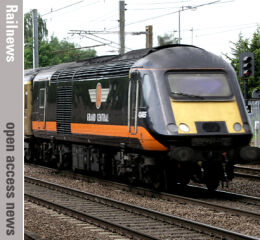Posted 29th May 2025
Charity sets out rail reforms as open access debate intensifies

The Campaign for Better Transport has published seven ‘key priorities’ for making the government’s programme of rail reform a success.
The list has appeared as the debate over open access continues to heat up.
Unpublished analysis from consultants Jacobs commissioned by LNER is reported to claim that the presence of open access operators on the East Coast Main Line is set to cost the state operator at least £1.1 billion over the next ten years, because of ‘revenue abstraction’, which is one of the main objections to open access operators.
Transport groups have been applying for an unprecedented number of open access licences recently, particularly after Labour won the 2024 election with a manifesto pledge to renationalise the former franchises. The first of these, South Western Railway, returned to public ownership on 25 May. The majority shareholder of SWR was FirstGroup, and it has been in the vanguard of open access applicants.
First has commissioned its own reports, and one of these said that its operator Lumo would pay more in track access charges to Network Rail than LNER. First has also denied the figure of £1.1 billion in revenue abstraction calculated by Jacobs.
A number of open access applications are outstanding, and transport secretary Heidi Alexander has been sounding a note of caution about them, while her department has declined to support nearly all the applications currently being considered by the Office of Rail and Road. Network Rail is also concerned, on the grounds that capacity on busy main lines is not unlimited.
LNER, meanwhile, has just increased the number of daily trains between London and Bradford from two to seven. Bradford has been served by open access operator Grand Central since 2010.
The Campaign for Better Transport is in favour of open access, saying that the government should give it support. It also wants the government to create a ‘strong foundation’ by establishing the ‘directing mind’ Great British Railways as soon as possible, be committed to increasing passenger traffic and have clear funding settlements, improve the service to passengers by such things as better information and accessibility, sort out the ticketing tangle by focusing on ‘consistency and affordability’ with a cap on long-distance fares and a ‘Rail Miles’ scheme, and draw up a strategic plan for rolling stock renewals.
The CBT also calls for a better deal for rail freight, which is mostly remaining in the private sector. It says the government should invest in freight infrastructure and create a fund for targeted electrification, while giving freight priority on key routes.
CBT’s chief executive Ben Plowden says: ‘The creation of Great British Railways presents a unique opportunity to change how the rail system works – structurally, financially and operationally – to provide a better customer experience. But legislation alone will not be enough. The clear strategy proposed in the Government’s recent consultation paper must follow. This must be grounded in long-term thinking, and focused on outcomes that matter to passengers, freight users and the public.’
The Campaign has published a policy paper called ‘Track changes: making a success of rail reform’.
Ben Plowden added: ’Rail has the potential to underpin the UK’s economic, environmental and societal ambitions by moving people and goods more efficiently, reducing emissions and connecting towns, cities and communities more effectively. But to realise this potential, we must quickly deliver what everyone in the rail sector wants, ending the cycle of short-term decision making and giving the railways the long-term clarity, consistent investment and strong leadership required to succeed.’
Do you have a comment? Please click here to send an email to Platform at Railnews.
Moderated comments will be published on this site, and may also be used in the next print edition.
